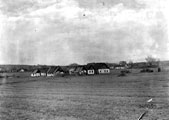Gisela Sarközi-Samer
"We played together, nothing else happened."
Gisela Sarközi was born in 1921 in Unterschützen in Burgenland, the youngest of six children. She went to the local primary school. Her teacher, Mr. Steiner, treated the Roma children no different from the rest, and the fellow students were cooperative. Outside school, Gisela Sarközi played with other children in the Roma settlement. She taught her brother, who worked as a bandleader, how to read and write German. At fourteen, she went to Bad Tatzmannsdorf, where she worked at a dressmaker's. During her lunch breaks, she learned how to use a sewing machine from a colleague. Later, she worked as a maid at a farm in Pinkafeld - from six in the morning until six in the evening, for two Austrian shillings a day. On June 29th, 1939, she was arrested by the SS, along with twelve other young Roma from Unterschützen, and deported to Ravensbrück concentration camp.
"In my family it was like this, my father was a blacksmith and my mother took care of us all."
"We always were with the other children, with my uncle's …"
"We were treated well by our teacher. He was taken to a concentration camp, too, because he was a socialist."
Roma in the Burgenland before 1938
The forced settlement of the Roma under Maria Theresia meant that many Roma lived in their own settlements in the Burgenland. The "Gadsche" (the local population) met them with suspicion and hostility. Regular raids were part of everyday life in the Roma settlements. So called "Zigeunerakten" ("gypsy files") were put together to enable more efficient supervision. At the "Zigeunertagung" ("gypsy congress") at Oberwart in January 1933, which was attended by local and national politicians, more "preventive measures" against Roma were discussed. After the takeover of the National Socialists, Tobias Portschy became "Gauleiter" (head of the NS administrative district) of Burgenland. He took a personal interest in finding a quick "solution to the gypsy problem". The first persecutions of Burgenland Roma began as early as March 1939. In June 1939, the first transport of 440 "gypsy women" from Austria left for Ravensbrück concentration camp.







